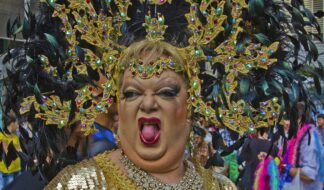by Jessica Carreras
An April 28 showing of the documentary "City of Borders," which follows the lives of gay Israelis and Palestinians, and the subsequent panel discussion brought several prominent ideas to the table concerning life as an LGBT Middle Easterner – including differences between Jerusalem and Tel Aviv, interfaith relationships and weighing civil rights against social acceptance.
The Jewish Gay Network and Middle Eastern LGBT organization AL GAMEA co-hosted the event as part of the annual Lenore Marwil Jewish Film Festival. Through a diverse panel comprised of Israeli Jew Matan Farris, Jordanian Christian Steven and Lebanese Muslim Charlie (real names withheld at their request), it aimed to bridge the gaps between religions and nationalities through the commonality of sexual orientation and gender identity.
Farris, who lived in Tel Aviv before moving to the U.S. several years ago, spoke of actually visiting Shushan, Jerusalem's only gay bar that served as the focal point of "City of Borders."
"It's very much like you saw in the movie," he said of the now-closed location, which still holds a similar gay night once a month.
"It's a really strong group of people that came together every month, every week – sometimes twice a week when it was in its prime – to get together and just be happier, be at peace and spread the love."
Conversely, the panelists spoke of violence against gays and lesbians in Israel and Palestine – another issue raised in the film.
"I felt that (Israeli parents) didn't want to support (openly gay Jerusalem city council member Sa'ar Netanel) because they were afraid that the violence would get to Tel Aviv eventually, and they have achieved a lot of gay rights in Tel Aviv," commented Charlie. "Now people that live in Tel Aviv and see the violence … are becoming afraid that this might happen to their kids."
Indeed, Farris added, their fears came true in 2009 when a gunman opened fire on Tel Aviv's gay community center for youth, killing two teens and injuring others.
That violence, and granting asylum to those caught in it, is of the utmost importance, Farris argued. "It's especially important to work for gay rights and asylum rights," he said, "but also within Palestinian society – for those of us who are Palestinian or who have interest in creating that kind of safe space in the Palestinian territories for the authority to work that much harder now than before. We have to keep this fight alive."
In regard to ties between Israel and the U.S., a question was raised about the comparisons between life for gay Arabs there and in Michigan. Steven said Dearborn "is kind of like Jerusalem and Tel Aviv." To be free as a gay Arab, one must leave Dearborn and the familial and religious restraints that lie within the Middle Eastern community there.
"(AL GAMEA is) having a hard time convincing those kids to join us, even on stuff that we do at homes, so they're not at the bar exposed or anything, because they're afraid," Steven, who is vice president of AL GAMEA, explained. "If you think of the movie title, 'City of Borders,' there's a certain border here that has to be crossed to feel a little safer, and that border is usually from Dearborn into Detroit. A lot of gay Arabs would have to leave Dearborn to feel safe."
Religion – both in the film and in life for Israeli and Palestinian gays in the U.S. and abroad – plays a big part in that struggle, forcing many to stay closeted or face ostracism from their communities and families. For many Middle Easterners, religious and social acceptance are one and the same. "A lot of tradition is based on religion, and some of the religion has become part of the tradition, so sometimes it's really, really hard to separate them," Steven elaborated. "Unfortunately, when we get together (through AL GAMEA), we kind of put the religious part behind. We're just friends that have a common goal, so that's what we work toward."
That common goal, all three panelists agreed, includes social acceptance before pushing for laws. In Israel, gay rights laws are widespread, including employment non-discrimination, recognition of same-sex marriages, adoption rights and open military service. But those laws, the panel said, mean nothing without society's support.
"I think social acceptance is more important than the rights," Charlie began. "The rights help you feel more safe, but if you're socially accepted, you'll be more safe regarding the law, if you have the rights or don't have the rights."
Farris agreed, adding that acceptance would come from living openly and being seen as equals. "Once it happens where there is widespread acceptance of our issues and needs – not through violence, not through guns or even assertion of our identity, but though human connectivity and understanding of our shared struggles and community from Jews to Palestinians, Israelis to Palestinians, gays and straights," he said. "We're all human beings and once that is understood from a human perspective, the rest will fall into place."









